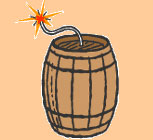|
 The English philosopher and alchemist Roger
Bacon is thought by modern historians to be the first
European to have come across gunpowder.
In 1248 a missionary brought him a
Chinese device known as a "firecracker"
that was used in celebrations. Intrigued, Bacon took it apart and analyzed
the contents to discover why it exploded rather than merely burned.
He soon worked out that the black substance, which was to become
known as gunpowder, was a mixture of saltpetre
and other chemicals. Bacon also apparently realised the huge
danger that this innocuous-looking
powder presented, and in his report he enciphered the
formula - an attempt to keep it a secret for as long as
possible. To find the true origins of gunpowder, however, we must
travel a few hundred years backward in time, and a few thousand
miles to the East. The English philosopher and alchemist Roger
Bacon is thought by modern historians to be the first
European to have come across gunpowder.
In 1248 a missionary brought him a
Chinese device known as a "firecracker"
that was used in celebrations. Intrigued, Bacon took it apart and analyzed
the contents to discover why it exploded rather than merely burned.
He soon worked out that the black substance, which was to become
known as gunpowder, was a mixture of saltpetre
and other chemicals. Bacon also apparently realised the huge
danger that this innocuous-looking
powder presented, and in his report he enciphered the
formula - an attempt to keep it a secret for as long as
possible. To find the true origins of gunpowder, however, we must
travel a few hundred years backward in time, and a few thousand
miles to the East.
Although the early history of gunpowder is murky, it is believed to have been invented
in China at about 900AD. Taoist
alchemists had been searching for the elixir of immortality, and were testing compounds such as saltpetre. Around this time
it was discovered that the addition of two common substances - charcoal and sulphur - improves the rapid burning of
saltpetre into an explosion. Sulphur is long known to science, and
by 200AD was being produced by roasting iron
sulphide.
The scientific principle behind explosives is simple enough. A
mixture of solids must burn vigorously to produce a large volume of
gas, which rapidly expands from the heat of the reaction. The
saltpetre is an oxidant, and allows the
charcoal to burn far quicker than if it only had access to oxygen in
the air.
2KNO3(s) + 3C(s) + S(s) -----> N2(g) + 3CO2(g) + K2S(s)
The Chinese used this reaction for noisemakers and
signalling rockets at first. The earliest mention of
gunpowder being employed for warfare dates to 1046. The first recognisable cannon or firearm with an enclosed blast chamber didn't arise until 1288.
Despite Bacon's best efforts, Europeans discovered the formula
and applied it to killing each other with great zeal. Weapon designs
developed rapidly, and gunpowder formulas were perfected. In 1429,
two Czech alchemists devised granulated gunpowder, which is much more
powerful and consistent, and less vulnerable to moisture. Gunpowder
revolutionised warfare during the 16th century, as ancient fortresses were suddenly vulnerable to
cannons, and guns became small enough to be wielded effectively by
infantry. It is acutely ironic that one
of the most destructive inventions in history was originally
developed from research into achieving immortality.
|
|
note:
|
alchemist: 炼金术士
Roger Bacon: 罗杰·培根
come across: 偶遇,碰到
missionary: 传教士
firecracker: 爆竹,鞭炮
saltpetre: 硝石, 硝酸钠
innocuous-looking: 看似无害的
encipher: 把…译成密码
formula: 配方
murky: 模糊的,不清楚的
Taoist:
道教的
elixir of immortality:
长生不老药
compound: 化合物
charcoal: 木炭
sulphur: 硫磺
iron sulphide:
黄铁矿
oxidant:
氧化剂
noisemaker: 发出噪音的东西
signal: 发射
recognisable: 公认的
cannon: 大炮
firearm: 火器,枪炮
blast chamber: 燃烧室
Czech: 捷克的
granulated: 颗粒状的
fortress: 堡垒,要塞
infantry:
步兵 | |